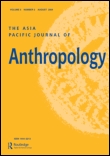Translating ‘Sustainability’ in Hawai'i: The Utility of Semiotic Transformation in the Transmission of Culture
Abstract
This paper examines how businessmen and educators in Hawai’i have semiotically ‘translated’ sustainability to promote sustainability practices. Using data gathered from an educational institute that was co-founded by a corporation and a college, I analyse how the source discourse was, using Silverstein’s term, ‘transformed’ so that the target discourse (or the signs used in the target discourse) invokes Hawaiian imageries rather than imageries of capitalism. Analyses reveal that changes to keywords of sustainability occur in a way that shifts possible local interpretations of them as cultural heritage, that is, as something ‘of Hawaiian’ and not ‘of white capitalists’. I argue that this translation effort assisted the concept’s transmission by making ‘sustainability’ an inhabitable category of identity and by providing a model of a future in which locals can participate because it is now interpretable as having been modelled on the narrated past.
Keywords Contextualisation, Cultural Heritage, Education, Semiosis, Sustainability, Translation
http://www.tandfonline.com/doi/abs/10.1080/14442213.2014.954601#.VK6F6sblelI
